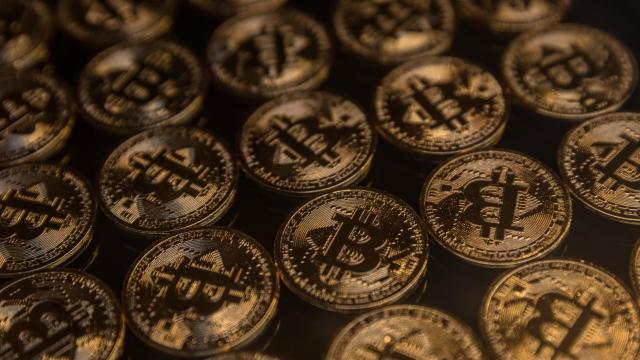Even hardcore investors will likely admit that the crypto community tends to attract some pretty scummy personalities; cyber-criminals, con-artists, and Elon Musk, for starters. Now, it looks like we can add white supremacists to that list as well; a new study from the Southern Poverty Law Centre probed into the crypto transactions of some of the most virulent extremists around and found them collectively raking in tens of millions of dollars in the currency over the course of the past decade.
The study tracked the blockchain transactions from hundreds of crypto-addresses associated with white supremacists and other known names among the far-right and found that many of the most prominent figures — like Don Black, for example, who founded the infamous neo-nazi haven Stormfront — had boarded the crypto hype train relatively early on. The research found Black’s first transaction taking place in mid-2014, when the price of a single asset was less than $US850 (A$1,186). Today, that price is closer to $US48,000 (A$66,908).
The first known figure to buy big into Bitcoin, according to this analysis, was Greg Johnson: the Editor in Chief of the far-right publishing house Counter-Currents. This person, for context, has viewpoints vile enough that Norway Officials arrested Johnson when he flew to the country in 2019 to speak at a “white advocates” conference. Intelligence officials at the time were (rightfully!) concerned about Johnson’s views, particularly his vocal respect for Anders Breivik, and stated that deporting Johnson back to the States would be the safer move.
The Centre found Johnson getting his hands on his first crypto assets — 29.82 Bitcoin — at the start of 2012. At the time, each asset was worth about $US5.50 ($8) each, meaning that Johnson had about $US164 (A$229) invested at the start. Since then, as the report notes, he “flipped the Bitcoin from that first transaction and additional ones into over $US800,000 (A$1,116,336) worth of value, largely thanks to the crypto-donations Counter-Currents solicited from readers of the far-right rag.
In a Telegram message that the Centre managed to track down, Johnson noted that he wasn’t openly shilling Bitcoin for his readers to get rich.
“It’s about having a money that you can travel with, that bad people can’t seize/inflate, and that will allow you to live in a safer, White neighbourhood and start a family,” Johnson wrote.
“It’s up to you guys to tell your friends and family about Bitcoin, also. Even if they are sceptical, they should see that you are enthusiastic about it because repeated exposure to new ideas is how they become accepted. So be the annoying Bitcoin guy at social gatherings.”
It’s a point that highlights how — at least early on — crypto adoption among far-right figures wasn’t driven by finances as much as philosophy. In an interview with NBC News, Megan Squire, a senior fellow at the Centre and the report’s co-author, noted that there’s a “pretty strong libertarian streak that runs through the far right,” and the fact that bitcoin relies on a decentralized ledger instead of a central bank holds a certain appeal for them.
Lump in the fact that the bulk of these figures tout historically debunked antisemitic tropes about Jewish people controlling the global financial systems and, well… you can understand why Bitcoin would become their go-to early on.
Over time, these figures’ shift to Bitcoin has become more about practicality; mainstream digital payment companies like Paypal and Stripe have famously cut ties with prominent far-right orgs. So when you’re a hate group trying to raise money in 2021, chances are you’re going to use crypto to do it.
Johnson might have been first to the crypto-party among the 600 Bitcoin wallets that the Centre tracked, but he was far from the richest. That honour goes to Stefan Molyneux, who opened his first Bitcoin wallet roughly a year after Johnson did the same. Over time, the Centre’s analysis estimated that his assets ballooned to a net worth of $US3.28 (A$4.58) million, thanks in large part to crypto-donations that are now the norm among fringe circles. The report states that donors gifted Molyneux a whopping 1250 Bitcoin tokens since he’d first opened his wallet. The actual value of these assets is always going to be in flux because, well, it’s crypto, but going by today’s numbers, that count is equivalent to $US60.3 (A$84) million dollars.
While the Centre’s been tracking some of these wallets for years — the Washington Post first reported on this effort in 2017 — the crypto community at large seems to fully ignore the fact that the currency’s been co-opted by well-known extremists. As cryptocurrency analyst David Gerard told the Centre:
Bitcoin started in right-wing libertarianism. This is not at all the same as being a neo-Nazi subculture. That said, there’s a greater proportion of Nazis there than you’d expect just by chance, and the Bitcoin subculture really doesn’t bother kicking its Nazis out.
Bitcoiners will simultaneously deny they have Nazis (which they observably do), and also claim it’s an anti-bitcoin lie, and also claim it’s good that anyone can use Bitcoin.
And if you’re wondering if the old school white supremacists can keep up with the changing times, the SPLC notes that former KKK imperial wizard David Duke has found a home on Odysee, “a blockchain-themed video site” where streamers can be compensated with an in-house currency.
Granted, these figures might not be able to use Bitcoin for that much longer. Coinbase, for example, has started deleting accounts from users that are caught donating to far-right accounts, like those known to belong to the Daily Stormer. While Coinbase certainly isn’t the only exchange around, it’s definitely one of the biggest names in the US, and could set the stage for other exchanges looking to kick off far-right figures from their networks. After all, if we can’t stop these scumbags from hoarding Bitcoin, the least we can do is cut off their donors.
